Europe
Visit by Minister for Foreign Affairs Fumio Kishida to the Kyrgyz Republic
Fifth Foreign Ministers’ Meeting of “Central Asia plus Japan” Dialogue
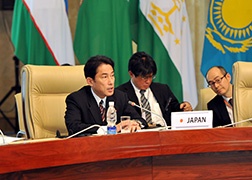
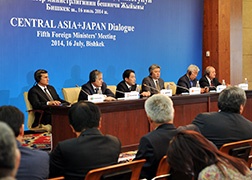
1 Significance and Results
The Fifth Foreign Ministers’ Meeting held on the tenth anniversary since the start of the “Central Asia plus Japan” Dialogue in 2004 was attended by foreign ministers from all the member countries for the first time ever. In the past 10 years, Japan joined the dialogue for regional cooperation in specific fields based on the idea that regional cooperation is necessary for stability and development of Central Asia. In this meeting, on the basis of this concept, the participants confirmed direction of the “Central Asia plus Japan” dialogue as a vision for “the next 10 years” that it will serve as a field for enhancing practical cooperation.
As a result of the foreign ministers’ meeting, the participants summarized 10 years of the “Central Asia plus Japan” dialogue, and signed the “Joint Statement” which includes a wide range of contents such as progress in regional cooperation in specific fields, importance of peaceful solution of conflict and cooperation in an international arena such as disarmament and non-proliferation. The participants also adopted the “Roadmap” which indicated directions of cooperation and specific examples in the field of agriculture.
- “Joint Declaration”(Japanese [PDF]
 /Russian [PDF]
/Russian [PDF] )
) - “Roadmap”(Japanese [PDF]
 /Russian [PDF]
/Russian [PDF] )
)
2 Discussion
- (1) In the opening session, Mr. Erlan Abdyldaev, Minister of Foreign Affairs of the Kyrgyz Republic (chair country), welcomed participants Ministers and stated that it was pleasant that the “Central Asia plus Japan” dialogue greeted the 10th anniversary and multitiered dialogue and cooperation in various fields were steadily progressing. Foreign Minister Abdyldaev also stated that he would like to deepen discussion with the participants on pressing issues.
Mr. Fumio Kishida, Minister for Foreign Affairs of Japan, expressed his gratitude for the efforts made by the Kyrgyz Republic, and stated that the Government of Japan would deepen the relationship with countries of Central Asia through both in-depth bilateral cooperation and the “Central Asia plus Japan” dialogue. Moreover, Foreign Minister Kishida also stated that the “Central Asia plus Japan” dialogue is developing into a field for enhancing practical cooperation in specific fields and, therefore, he would like to exchange opinions on the vision for “the next 10 years”. - (2) In a session on cooperation in the field of agriculture, Foreign Minister Kishida appreciated the fact that representatives of diplomatic authorities and experts of agriculture from Central Asia had visited Japan and held discussions with the officials from the Ministry of Agriculture, Forestry and Fisheries, the Japan International Cooperation Agency (JICA) and representatives from private enterprises and stated that he was pleased that as a result of such efforts, each country had agreed on advancing cooperation in every step of food value chain, such as production, quality management, processing and storage in specific fields such as vegetables, seeds, livestock raising, grain, sericulture, and measures against pests. Foreign Minister Kishida also stated that he would grow cooperation that would contribute to both Japan and Central Asia by utilizing the “advantage” of Japan. Foreign Minister Kishida added that each country would form specific projects, which would contribute to the region, utilizing technology and experience of both public and private sectors of Japan depending on the projects of each country. The Central Asian side stated that traffic and transportation, food and environmentally-friendly products are also important.
- (3) In a session on sustainable development (disaster reduction, women, etc.), Foreign Minister Kishida appreciated the efforts by each country for achieving the Millennium Development Goals (MDGs) of each country and stated that he would cooperate with Central Asia on the Post-2015 Development Agenda. Concerning disaster reduction particularly, Foreign Minister Kishida stated that cooperation had been progressing in the “Central Asia plus Japan” dialogue and mentioned promotion of cooperation through coordination between both public and private sectors and cooperation for the regional cooperation meeting to be held in Bishkek, taking the Third UN World Conference on Disaster Risk Reduction into consideration. Moreover, concerning women’s opportunities to participate in the society that the Government of Japan had been emphasizing, Foreign Minister Kishida stated that although Japan had already cooperated with Central Asian countries concerning maternal and child health as part of development assistance, Japan would like to learn about women’s participation in society from experiences of the Central Asian countries. The Central Asian countries raised issues from wider perspectives, such as remarks on measures against earthquake and water-related issues including water-saving measures, brine damage and desertification, and access to safe water.
- (4) In a session concerning anti-drug measures and border management taking the situation in Afghanistan into consideration, the Central Asian side stated that Afghanistan is not an issue of the past and they need to work on this issue with a sense of crisis. Some countries expressed their views that the situation is getting severer. At the same time, the Central Asian countries stressed that military force should not be used for the solution of the issues and stressed the importance of peaceful solution.
Foreign Minister Kishida, mentioning the visit to Kabul by Mr. John Kerry, Secretary of State of the United States, expressed his positions that he would urge fair and peaceful progress of all the processes of the ongoing presidential election in Afghanistan until announcement of the final result is made. Foreign Minister Kishida also expressed his idea to continue support of efforts for stability and development of Afghanistan. Moreover, Foreign Minister Kishida stated that he was encouraged by implementation of assistance for stabilization of Afghanistan by countries of Central Asia and the Government of Japan welcomed such assistance and would advance cooperation with each country for anti-drug measures and border management. Specifically, Foreign Minister Kishida expressed his idea that he was prepared to continue cooperation with Central Asian countries based on the reality of each country as well as already-implemented cooperation including provision of inspection equipment for border management, follow-up of training courses for customs and anti-corruption measures, including strengthening coolaboration between countries and promotion of regional cooperation through an international organization. - (5) In the closing session, Mr. Erlan Abdyldaev, Foreign Minister of Kyrgyz Republic expressed his gratitude for cooperation from every country for the meeting and summarized enhancement of practical cooperation through the “Central Asia plus Japan” dialogue. Mr. Rashid Meredov, Deputy Chairman of the Cabinet of Ministers and Minister of Foreign Affairs of Turkmenistan, introduced willingness as the next chair country and his ideas on future activities.
Foreign Minister Kishida stated that he was pleased by signing of the Joint Declaration, which includes words and ideass such as “proactive contribution to peace” based on the principle of international cooperation and importance of peaceful solution of conflict on the basis of international law. Foreign Minister Kishida also stated that as part of the “proactive contribution to peace”, he would proceed with cooperation in disarmament and non-proliferation. Finally, Central Asian countries mentioned the importance of holding a meeting by Central Asian countries itself and highly evaluated the roles of Japan that it had played as a “catalyst” for regional cooperation.
Bilateral Meetings
I Itinerary
Courtesy call on H.E. Mr. Almazbek Atambaev, President of the Kyrgyz Republic, Japan-Kyrgyz Foreign Ministers’ Meeting, E/N signing ceremony concerning ODA projects, Japan-Uzbekistan Foreign Ministers’ Meeting, Japan-Turkmenistan Foreign Ministers’ Meeting, and Japan-Kazakhstan Foreign Ministers’ Meeting in the morning of July 16.
II Overview of major meetings
1 Meeting between Mr. Erlan Abdyldaev, Minister of Foreign Affairs of Kyrgyz Republic
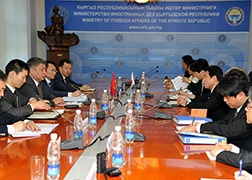
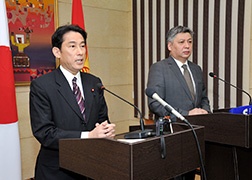
- (1) At the beginning
- Foreign Minister Abdyldaev welcomed Foreign Minister Kishida’s visit to the Kyrgyz Republic and welcomed activated exchange between the two countries in the recent years.
- (2) Bilateral relationship/economic cooperation
- Foreign Minister Abdyldaev stated that he regards Japan as a most important partner, and expressed the wish to steadily implement the agreement that had been reached in the time of President Atambaev’s visit to Japan in February last year, and the Kyrgyz Republic, as a democratic country, needs assistance from Japan as a country that shares values. In response to this, Foreign Minister Kishida expressed the position of the Government of Japan to continue assisting nation-building of the Kyrgyz Republic and conveyed the decision by the Japanese government that it would provide a total of approximately JPY 12 billion of yen loans for renovation of the highway and its disaster reduction following to the agreement between two countries to cooperate on acceleration of formulation of appropriate projects for resuming yen loans reached upon President Atambaev’s visit to Japan.
In addition to the above, Foreign Minister Kishida stated that the Government of Japan was considering grant aid in airport development, health care, and disaster reduction for which technologies of Japanese small and medium-sized enterprises can be utilized. Minister Abdyldaev, in response, expressed his gratitude for the past economic cooperation that Japan had provided to the Kyrgyz Republic. - (3) E/N signing
- After the meeting, Foreign Minister Kishida and Ms. Olga Lavrova, Minister of Finance, signed Exchange of Notes on grant aid projects “Project for Improvement of the Equipment for Road Maintenance in Osh, Jalal-Abad and Talas Oblasts” and “Project for Human Resource Development Scholarship”.
2 Courtesy call on H.E. Mr. Almazbek Atambaev, President of the Kyrgyz Republic
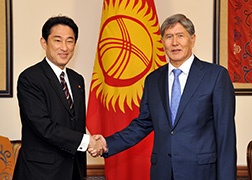
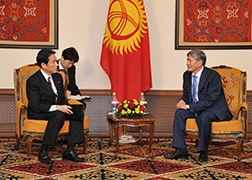
- (1) At the beginning
- President Atambaev welcomed the first visit to the Kyrgyz Republic by the Japanese Foreign Minister in recent 10 years and pointed out that Japan and the Kyrgyz Republic are spiritually close and they are democratic countries having the spirit of freedom.
- (2) Bilateral relations/economic cooperation
- Mentioning his respect to the people of Japan, President Atambaev gave an explanation on his ideas concerning enhancement of the relationship with Japan.
Foreign Minister Kishida expressed the policies of the Government of Japan to continue its support to efforts by the Kyrgyz Republic for democratization and conveyed the Japanese government’s decision that it would provide a total of approximately JPY 12 billion of yen loans for renovation of the highway and its disaster reduction based on the agreement to accelerate formulation of appropriate projects for resuming yen loans reached upon President Atambaev’s visit to Japan in February last year.
3 Meeting with Mr. Abdulaziz Khafizovich Kamilov, Minister of Foreign Affairs of the Republic of Uzbekistan
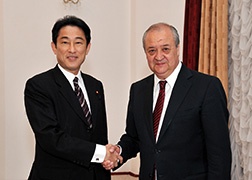
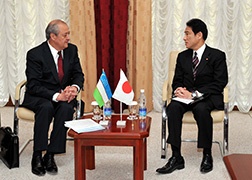
- (1) Bilateral relationship
- Foreign Minister Kishida expressed his expectation that economic cooperation from Japan would be beneficial for the development of Uzbekistan, stating that Japan emphasizes enhancement of partnership with Uzbekistan.
- (2) Economic cooperation
- The two foreign ministers shared their views on continuing prompt and strict efforts concerning the illicit case of Japan Transportation Consultants, including formulation of preventive measures, and Minister Kishida stated that Japan would consider future cooperation checking the progress of efforts by the Uzbekistan side on the case.
4 Mr. Rashid Meredov, Deputy Chairman of the Cabinet of Ministers and Minister of Foreign Affairs of Turkmenistan
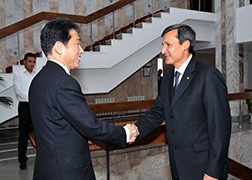
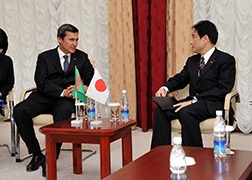
- (1) Bilateral relations
- Both ministers welcomed further progress of the bilateral relationship including private sectors after the visit to Japan by H.E. Mr. Gurbanguly Berdimuhamedov, President of Turkmenistan, in September last year. Moreover, both ministers welcomed the progress of projects, in which Japanese enterprises participate, and that was announced upon the president’s visit to Japan, and exchanged opinions on promotion of human exchanges for further progress of the relationship.
- (2) International relations, “Central Asia plus Japan” dialogue
- Regarding the situation in Afghanistan, the two ministers exchanged opinions on cooperation in the fields of anti-drug measures and border management.
In addition to the above, the two ministers shared their views on cooperation for the progress of the Foreign Ministers’ Meeting of “Central Asia plus Japan” dialogue together with Turkmenistan, the next chair country.
5 Meeting with Mr. Eerlan Idrissov, Minister of Foreign Affairs of Kazakhstan
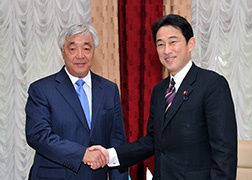
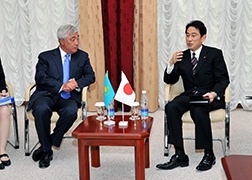
- (1) Economic relations
- Foreign Minister Kishida expressed his welcome on the start of operation of a plant of Toyota Motor Corporation in Kostanay and stated that he would like to expand cooperation with Kazakhstan on various occasions in an international arena in the future.
- (2) Bilateral relations
- Foreign Minister Idrissov, within the context of the economic relations, introduced the fact that Kazakhstan had recently introduced a unilateral visa exemption to countries including Japan. Highly appreciating the fact, Foreign Minister Kishida mentioned that some Japanese enterprises are interested in participating in the plan of construction of a nuclear power plant in Kazakhstan and stated that Japan was prepared to provide cooperation for reform efforts of Kazakhstan which aims at joining the leading 30 countries by 2050.
- (3) Cooperation in an international arena
- Foreign Minister Kishida highly appreciated Kazakhstan’s proactive efforts on global issues including disarmament and non-proliferation and expressed his welcome on the recent signing of the protocol concerning negative security guarantee of the Treaty on a Nuclear-Weapon-Free Zone in Central Asia by five nuclear weapon states, as Japan has been involved in the Treaty from drafting to its establishment.
(In addition to the above, Foreign Minister Kishida also had a conversation with Mr. Sirodjidin Aslov, Minister of Foreign Affairs of the Republic of Tajikistan, who visited Japan last June, with regard to the results of his visit to Japan.)


 (Open a New Window)
(Open a New Window)